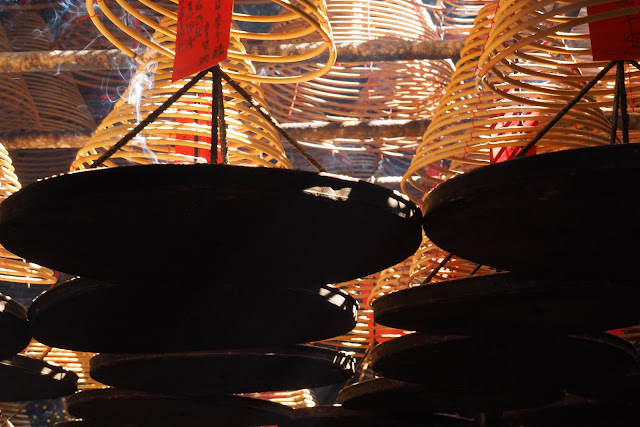So many coils of incense, each burning with the hope embodied by the prayer sheet or wish list in red, the color of life.
a literal forest of coiled incense, a custom imported from ancient India

This is Mo Tai (武帝) or Kwan Tai (關帝), a legendary Chinese deity
popularly called Kwan Kung (關公) based upon a famous real life army
general called Kwan Yu (關羽), an expert in the use of the curved chopper
stuck to the end of a long wooden pole named after him, called Kwan To
(關刀) and now worshipped as a god governing all things having to do with
the use of bodily force or personal violence, legitimate or illegitimate
and is thus worshipped by both the policemen and triad gangsters

The god Emperor Man Cheong (文昌帝君) with
the full title "Emperor Man Cheong Tung Tai "文昌梓潼帝君"., a god which
legends say governs man's fate in examinations and more generally
occupations, jobs, careers associated with book learning. Emperor Man is served by two book boys (書僮). One of them is called The "Heavenly Deaf" (天聾) and the other is called the "Earthly Mute" (地啞), supposed to impress or remind people that the secrets of fortune can never be disclosed whether from heaven or on earth and that people who are engaged in the use of words should say little.That sounds remarkably like the advice given by the modern philosopher Wittgenstein, who is claimed by his students to have said, "Whereof we know not, we must be silent. "
Chinese people are very accepting. They worship all kinds of gods. To them, it really doesn't matter how the deities started their lives as gods. So long as they are considered efficacious, they will be worshipped. Hence the huge number of coils at this temple, the so-called Man-Mo Temple (Wen-Wu Temple) (文武廟) or the Temple of the "god of Word/Language/literature" (文帝) and the "god of martial arts" (武帝) , a temple in Hollywood Road entrusted to the Tung Wah Group by law in 1908. The Tung Wah Group used to be the bridge between Chinese community and the British Colonial Government. Their officials were given authority to settle disputes between Chinese citizens as a kind of local magistrate. The temple was built in stages with donations by wealthy Chinese merchants in the period 1847-1862 and originally comprised three separate buildings, one dedicated to Emperor Man Cheong, a second to Emperor Mo, and a third to miscellaneous minor deities called Lit Shing Kung" (列聖宮) or "palace of various deities and holy men" (諸神列聖). That's why you find so many coils of smouldering incense there.
In this temple the tens of coiled incense are held up by a simple metal frame, formed by metal pipes tied together by cords like in Chinese bamboo scaffolding, the incense coils being hung up upon S-hooks tied to the poles with a piece of red string.
There is an open courtyard separating the entrance of the temple from the altars further inside upon a raised platform, occupied by two huge incense bowls for the more traditional joss sticks which may be inserted upon a bed of ashes by the worshippers
If they like, worshippers may also light candles.
Above the candles are the prayer sheets upon which are written the prayers of the faithfuls asking for various favors from the gods.
To save the trouble of having to sweep up the ashes dropping to the floor, underneath each coil of incense is a huge round metal ash tray suspended from the ceiling bars.

The ash trays.
How their wishes criss-cross each other! I can't help wondering if it's
possible for two enemies to go up there to offer their respective
prayers to the two gods in the temple with equal and opposite wishes and
if so, how the deities might resolve the inevitable contradiction. It's
not that unimaginable: that happened in Northern Ireland, where the
Catholic IRAs and the English Anglicans soliders both go to their respective
churches to worship the same God and pray to him for success for their
side, during the Hundred Years War between England and France and during both First World War and the Second World War when Christian nations were fighting each other with army chaplains on each side praying for their soldiers to the same God and during the war in Iraq when Christian soldiers were fighting against Islamic soldiers each worshipping the same deity viz. the God of Abraham but called by different names! .










沒有留言:
張貼留言